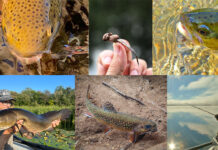Who wouldn’t want to retire to a national park? What others call the vacation of a lifetime, you call home.
Yes, you can live in a National Park. Even better — there are free places to live in national parks. And the icing on the cake? You can live in national parks and earn money while doing so.
Of course an opportunity like this comes with a catch: You’re going to need to do something to earn the privilege. But whether the work you put in is volunteering a few hours a week or working full time, it just might be the most rewarding experience you’ve ever had
I’m a retired park ranger, I’ve lived and worked in national parks across the country, and have hired and worked with a bunch of great retirees that have made a national park their home — at least while they were working or volunteering in the park.
Let me give you three options for finding your retirement park. The same options will work for other vacation destinations on public lands, from national forests to state parks, so you’ve got a huge selection from which to choose. Let’s take a look.
Option 1: Volunteer
National parks rely on volunteers for many important functions from staffing visitor center desks to acting as campground hosts, giving interpretive walks to performing maintenance and engineering tasks. Some national parks even host artists in residence. If you’ve got a skill, it’s got a home someplace in the National Park System.
One of the most popular volunteer positions in parks and forests is that of the campground host. Rangers covet good campground hosts. Hosts help visitors check in to their campsites, answer questions about the campground and the park, resolve minor problems and maintenance issues, and refer bigger issues on to the ranger or maintenance staff.
Incidentally, while it’s by no means a job requirement, there’s a longstanding tradition of campground hosts occasionally baking cookies for the young seasonal campground rangers, away from home and college for the summer. I’d be remiss without mentioning this.
Campground hosts get a pad to park their RV, usually right up front in the campground. There’s usually water and electricity customarily provided gratis. Always ask about the logistics of your setup before accepting an offer.
Having your own RV for housing may also help you out with landing other volunteer positions, beyond that of campground host. Park housing is always tight during the summer, so if you bring your own, that may help out. It just depends on the park’s ability to accommodate it. A former NPS campground host that worked for me found an ideal volunteer position with the Forest Service that provided a quiet, fairly remote campsite for volunteering a few days a week in a small visitor center.
Some parks are able to provide housing for volunteers, but housing options will vary. If you’re volunteering as a couple, your options will be a bit more limited. However it’s extremely common for retired couples to volunteer together (a park can essentially get two volunteers for the price of one), so don’t be discouraged. Also, your willingness to volunteer at other times of the year outside of peak season may help you find a volunteer position with housing.
How long will you need to volunteer? It depends. Some parks choose to give more people a chance to volunteer, so they’ll rotate volunteers out after a few weeks. Other positions may want you to volunteer for the entire season, maybe longer. It varies from position to position and from park to park.
And the good news is that because you’re a volunteer, there’s a variety of work schedules available — from five days a week, to two days on/four days off and everything in between, depending on the position.
It’s also possible that you may receive a small stipend to cover some expenses, but if you’re looking for income, and a better selection of housing, the next options are for you.

Option 2: Work For The National Park Service
Yes, you too can be a ranger. While not too many years ago parks would get many times more applicants than they had positions available, not so today.
Of course work requires more of a commitment than volunteering. You’ll have to apply months in advance, meet the requirements, show up on time, work more hours than a volunteer, and keep your commitment to work for as long as you agreed. But paid employees get priority over volunteers for housing. That said, because you’re getting paid, you’ll also be expected to pay for housing — and housing isn’t cheap due to laws that require the government to charge rates commensurate with the vacation communities that surround the parks. However, employee housing comes with a built-in community of friends, making your park job that much more rewarding.
What types of positions are available for retirees? Summer seasonal work can involve collecting fees at an entrance station, running campgrounds, maintaining facilities or equipment, working at a visitor center, or even giving interpretive walks and talks (if you have the proper education).
Permanent, year-round jobs are more challenging to obtain, and the process of getting one is a topic unto itself. Before you jump to that level, consider some time volunteering or working seasonally to get a sense of what an NPS career is about.
These are government jobs, so expect more red tape and more requirements than working in the private sector. And speaking of the private sector…

Option 3: Work For The Private Sector In A Park
If you want to increase your odds of finding a summer job with housing in a park, consider looking at the private businesses that operate in parks with permission from the NPS — also known as park concessionaires.
Concessionaires can offer situations perfect for couples. A restaurant and gift shop concession in a park I used to work in had a wonderful couple that managed the facility and lived on site. They essentially had their own mountaintop chalet to themselves every evening all summer long. I just saw a concessionaire online seeking a family to manage a remote fishing operation — fly fishing expertise required, cabin provided.
Even in the best years, concessionaires in national parks have challenges in finding good employees. I’ve been in parks where they’ve had to fly students in from Europe to fill their positions. So if you’re a responsible adult with a good work history, you’re a hot commodity. Don’t expect to grow rich, but do expect to be appreciated and offered some enticement to stay on the job.
The quality of housing available will depend on the park, position, and location. If you’re looking at the parks with hundreds of concession employees, you’re not going to want to live in the dormitories that the majority of their employees share. It’s less than the relaxing experience you’re looking for. You’re going to have to find an exceptional position in a more remote location. But with so many options, there’s going to be something that fits you to a tee.

Finding A Volunteer Position
For volunteer positions with the federal government, check out volunteer.gov, a one-stop shopping venue for volunteering for multiple agencies, including the National Park Service, US Forest Service, Army Corps of Engineers, Bureau of Land Management, and more.
You can search available positions by location, type of job, housing and amenities, and other factors.
If you have a specific park in mind, I recommend calling or visiting the park to find out more information. Many parks have a volunteer coordinator who will connect interested parties with the right opportunity. If you’re talking to a volunteer coordinator, ask about other volunteering opportunities in the area. You may find a volunteer position with the Forest Service is right up your alley. It’s good to shop around.
Some parks will start posting their recruiting announcements on volunteer.gov six months or more in advance. This doesn’t mean that there aren’t plenty of positions available on shorter notice, it’s just that the better ones get filled early. If you have a specific park in which you’d like to work, contact the park’s volunteer coordinator for an idea of when you’ll need to apply.
Finding A Ranger Position
Finding a paid position with the National Park Service is going to be more time-consuming. The online application process is cumbersome, and the screening is more rigorous.
The website for jobs with the federal government is USAjobs.gov. The application deadline can be six months in advance — summer hiring can go on in December and January — so if you have a specific park in mind, it’s best to find out when they do their seasonal hiring and be on the lookout.

Getting A Job with A Concessionaire
Getting a private-sector job with housing in a national park is relatively easy. The application procedures are simpler, and there are fewer deadlines to deal with.
The thing that is a bit more complex is that there’s no one-stop website for concessionaire jobs. You’re going to have to find who operates the concession in the park you want and apply with them. Not hard, but a bit of online searching.
The closest thing to one-stop shopping for a concession job in the parks is xanterrajobs.com. Xanterra operates concession facilities in seven large national parks. But as I mentioned before, the parks with large numbers of employees may house them in dormitories. Consider looking for smaller, more isolated parks. Some may even be able to accommodate you if you have an RV.
One deciding factor in your choice of park jobs may be your pet, if you have one. A majority of NPS and concession housing for seasonal employees and volunteers won’t allow you to bring a pet with you. If you’re in your own RV, a pet may not be an issue, but check in advance before you get too far along in the planning process.
Whether you’re looking for a volunteer position or job this summer or next, now’s a perfect time to start looking around and seeing what your options might be, figure out the application process, and get a sense of your housing options. See you in the parks!
For additional inspiration, consider:
Credit: Source link





























